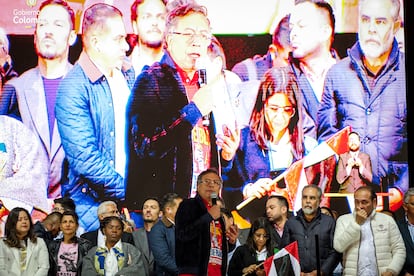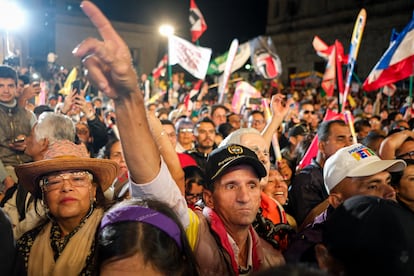"The United States government has decided to choose the mafia as its ally in Colombia," said Gustavo Petro late Friday afternoon, just hours after the United States government included him on the so-called Clinton list, alleging the Colombian president's ties to drug trafficking."We are not kneeling, we are not going to take a step back," he insisted to the cheers of thousands of supporters who filled the Plaza de Bolívar, as he had summoned them days earlier to demonstrate in favor of his proposal for a Constituent Assembly. The meeting, adorned with signs in defense of the"constituent power" championed by the leftist leader, ended up becoming a great platform for him to respond to accusations from Donald Trump's administration from the street, the place where he moves most comfortably and naturally.
The call came amid heightened political tension. Petro chose a Friday afternoon, two days before the referendum through which the Petrismo will define its presidential and congressional candidates for next semester's elections, and at the close of a week in which he was locked in a crisis with the United States and his supporters suffered the emotional defeat of the acquittal, on appeal, of his nemesis, former President Álvaro Uribe Vélez. Therefore, the protest was expected ever since Petro issued the call, after learning of Uribe's exoneration in a criminal case that has kept Colombia on tenterhooks for more than a decade. And the US government's decision, announced early that same afternoon, heightened expectations.
About two hours before the president appeared on stage, thousands of his supporters were filling the central plaza. Heliodoro Africano, a 67-year-old retired teacher, came to show his"total support" for the government's social reforms, which"Congress is repealing." He is particularly concerned about the pension system, whose fate is currently being decided by the Constitutional Court. He also did so, according to him, as unreserved support for Petro,"the only president who hasn't bowed down to the US government." "Not even Lula [the president of Brazil] has been so open," he insisted.

Trump's attack on Petro also brought Sergio Suárez, a 50-year-old merchant, to Plaza Bolívar."The president of the United States wants to be king of the world and let everyone do what he says. I think that's not right," he argued. He also attended because he agrees with the Constituent Assembly proposal."It would be a way to rethink the situation and try to make the changes that haven't been possible until now because of the constant legal obstacles."
Among the thousands of people who filled the plaza, where a huge flag of the M-19—the guerrilla group to which President Petro belonged—was displayed, were students, retirees, workers, unions, batucada groups, and indigenous delegations who came from different parts of the country. Henny Gutiérrez, 49, came from Puerto Carreño (Vichada), where she is the governor of a municipal council. She had to travel first by boat to Puerto Gaitán (Meta) and from there to Bogotá by land, a journey that takes more than 10 hours. “We have to support the processes that President Petro is leading; it is the only option for the indigenous peoples.”
Two enormous screens located in the plaza projected the president's walk from the Nariño Palace to the platform. He did so surrounded by some of his closest allies: Interior Minister Armando Benedetti; Director of the Administrative Department of the Presidency, Angie Rodríguez; and advisor Víctor de Currea Lugo. He was also accompanied by Vice President Francia Márquez, with whom he appeared to have an unusual closeness, in a relationship that has been distant between the two. Behind him was the rest of the cabinet, which accompanied him on platform for the hour and a half of his speech.
"Trump doesn't even know exactly where Colombia is, or who planted the coca crops and who stopped them," the president questioned, wearing a red-background shirt that read,"The people are sovereign. National Constituent Assembly." He continued: "Mr. Trump is attacking the Colombian leader who has most opposed drug trafficking, thirsty for political power and blood in Colombia."
In any case, Petro linked the decision in Washington to Colombian domestic politics."In Mexico and Brazil, everyone, from the richest to the poorest, rallied around their president. Here, the opposite happened; here, it was groups of fake businessmen and fake politicians who motivated the American far right to impose sanctions on Colombia and its president." And, without mentioning him, he attacked former President Uribe, leader of the Colombian right:"His ally is a former president who grew up among the mafia of Pablo Escobar's Ochoa cartel, who promoted the legalization of armed drug trafficking organizations." The president reiterated this idea several times: the sanctions imposed by the United States are the result of a coordinated strategy by the Colombian far right, which is encouraged by connections in Washington.

Later, he outlined what he believes to be the underlying reason for the sanction: his active role on the international stage against the genocide perpetrated by Israel in Gaza."My last speech at the United Nations made a difference, and that's why they're punishing me," he said, referring to his recent intervention in the General Assembly, in which he attacked Trump and proposed a special force"to stop the genocide in Palestine." Regarding the sanction, Petro said it's a punishment he mocks, since it prevents him from doing business, but he doesn't do business."We don't respond to Mr. Trump by kneeling, but by standing firm and taking to the streets to defend the rights of the people, of democracy," he said,"in defense of Colombia, which is being attacked by the forces of greed, by the forces of tyranny, by the forces of the mafia."
From that point, the exercise of sovereignty, the president tied his remarks to Sunday's referendum."I know we're approaching an election for the Congress of the Republic. I myself, on Sunday, will vote in the referendum on the Historic Pact," he explained, and clarified:"I'll see for whom; I can't say who." He then noted that his Constituent Assembly project, which will require the collection of 2.5 million signatures, is not intended to reach the current Congress, but rather the one elected in March. Therefore, he says, the campaigns will be divided"between those who support the people becoming a constituent assembly again, and those who oppose it." He explained that the Constituent Assembly will only seek to have social reforms approved by direct popular vote, rather than through a lengthy legislative process, and that his intention is to run a popular campaign to promote this initiative in parallel with the current electoral period.
"I have called you here, then, to call all of Colombia to the Constituent Assembly, not to write articles in my favor," he concluded, before announcing that he would like to be a member of that Constituent Assembly,"if you decide." He thus launched not a campaign for his presidential reelection, something prohibited in the country and which the opposition has waved like a specter, but a path to promote the Constituent Assembly and, subsequently, be one of those who write a new Constitution.

